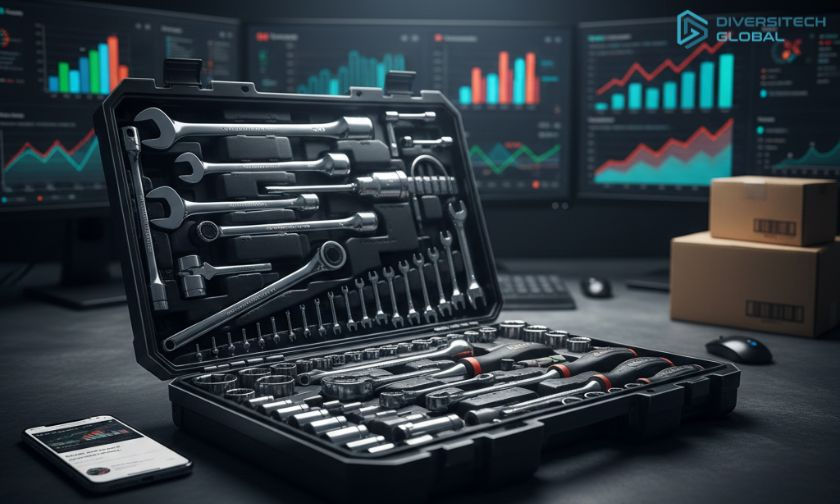Bulk Buying Power Tools from India: Logistics, Strategies, and Negotiation Tips
- Diversitech Global

- May 29, 2024
- 7 min read
Updated: Jun 4, 2024

Are you looking to expand your business by sourcing power tools from India? Bulk buying power tools from Hand & Power Tool Manufacturing in India can be a lucrative and rewarding venture, but it comes with its own set of challenges. Join us as we explore the intricacies of this dynamic industry and uncover the key factors that can help you achieve success in your business endeavors.
Logistics for Bulk Buying Power Tools from India
When it comes to bulk buying power tools from India, understanding the logistics involved is crucial for a smooth and efficient process. This section will guide you through the essential logistics aspects, including required documentation for importing, selecting a reliable freight forwarder, and managing the shipping process.
Why Understanding Logistics is Crucial
Logistics plays a vital role in the success of your bulk buying venture. It involves the planning, coordination, and management of the flow of goods from the supplier in India to your destination. By understanding the logistics process, you can ensure timely delivery, minimize transit risks, and optimize costs.
Required Documentation for Importing
Importing power tools from India requires specific documentation to comply with customs regulations. Understanding the necessary paperwork will help you avoid delays or complications. Some essential documents include:
Commercial Invoice: Provides details of the products, quantities, prices, and terms of sale.
Bill of Lading/Airway Bill: Serves as a receipt of goods and a contract of carriage between the exporter and the shipping carrier.
Packing List: Lists the contents of each package and their specifications.
Import License: Some countries may require an import license for certain types of power tools.
Customs Declaration: Provides information about the goods being imported, their value, and other relevant details.
Consulting with an import-export expert or customs broker can be beneficial to ensure compliance with all necessary documentation requirements.
Related Article: Export Opportunities for Indian Hand & Power Tools
Selecting a Reliable Freight Forwarder
Choosing the right freight forwarder is crucial for the smooth transportation of your bulk power tool shipments. A freight forwarder acts as an intermediary between you and the shipping carrier, handling the logistics, documentation, and customs clearance. Consider the following factors when selecting a freight forwarder:
Experience and Expertise: Look for a freight forwarder with experience in handling power tool shipments and expertise in the Indian market.
Network and Connections: A freight forwarder with a strong network and connections can provide competitive shipping rates and ensure efficient transportation.
Reliability and Track Record: Check the reputation and track record of the freight forwarder to ensure reliability and timely delivery of your shipments.
Services Offered: Consider additional services offered by the freight forwarder, such as customs clearance, insurance, and tracking capabilities.
By selecting a reliable freight forwarder, you can streamline the logistics process and have peace of mind knowing that your power tool shipments are in good hands.In the next section, we will explore strategies for bulk buying power tools from India. These strategies will help you find reliable suppliers, negotiate favorable deals, and ensure the quality of the products. Let's dive in!
Related Article: Top Indian Power Tool Brands
Strategies for Bulk Buying Power Tools from India
When it comes to bulk buying power tools from India, implementing effective strategies is essential for success. This section will explore key strategies that will guide you in finding and selecting suppliers, negotiating favorable deals, and ensuring the quality of the products you purchase.
Indian Sourcing
Since 2000, Diversitech Global has assembled and shipped over 30 million tool kit combinations globally, solidifying its position as a leading supplier of DIY hand and power tool sets in Asia.
As a reputable Indian manufacturing sourcer, Diversitech collaborates with top-tier local manufacturers to deliver exceptional value to clients. The company meticulously audits factories based on technical, ethical, and environmental standards, ensuring compliance and high-quality production. This proactive approach to quality management, prioritizing prevention over correction, guarantees that every product meets stringent safety regulations and client-specific requirements.
Related Article: What Indian Hand and Power Tool Manufacturers Can Offer
Finding and Selecting Suppliers
Finding reliable and trustworthy suppliers is crucial for a successful bulk buying venture. Here are some strategies to help you find and select suppliers in India:
Online Platforms: Utilize online marketplaces and directories to find a wide range of suppliers. Websites such as Alibaba, IndiaMART, and TradeIndia are popular platforms where you can connect with suppliers and explore their product offerings.
Trade Shows and Exhibitions: Attend trade shows and exhibitions related to the power tool industry in India. These events provide an excellent opportunity to meet suppliers face-to-face, assess their products, and establish business relationships.
Local Industry Associations: Connect with local industry associations in India that specialize in the power tool sector. These associations can provide valuable insights, connect you with reputable suppliers, and offer networking opportunities.
Supplier Verification: Before finalizing a supplier, conduct thorough due diligence. Verify their reputation, certifications, production capabilities, and quality control processes. Request samples or visit their manufacturing facilities, if possible, to assess the quality of their products.
Negotiating Bulk Purchase Deals
Negotiation skills are key when it comes to securing favorable deals for bulk purchases. Here are some strategies to help you negotiate effectively:
Research and Market Analysis: Conduct extensive research on market prices, competitor offerings, and prevailing industry trends. This knowledge will empower you to negotiate from a position of strength and make informed decisions.
Quantity Discounts: Leverage the advantage of bulk buying by negotiating quantity discounts. Suppliers are often willing to offer lower prices for larger volume orders.
Payment Terms and Conditions: Negotiate favorable payment terms, such as extended credit periods or flexible payment options. This can help improve your cash flow and provide greater financial flexibility.
Long-Term Partnerships: Express your interest in establishing a long-term partnership with the supplier. This can incentivize them to offer better prices and prioritize your orders.
Related Article: Partnering with Indian Hand & Power Tool Manufacturers
Quality Assurance and Inspection Techniques
Ensuring the quality of the power tools you purchase is crucial to maintain customer satisfaction and avoid any potential product issues. Here are some strategies for quality assurance:
Product Specifications: Clearly define your product specifications to the supplier, including quality standards, features, and certifications required. This will help align expectations and ensure that the delivered products meet your requirements.
Quality Control Inspections: Implement a rigorous quality control process by conducting inspections at different stages of production. This can include pre-production samples, in-process inspections, and final product inspections.
Third-Party Inspection: Consider engaging third-party inspection agencies to conduct independent quality checks. These agencies can provide unbiased assessments and ensure compliance with industry standards.
By implementing these strategies, you can effectively find reliable suppliers, negotiate favorable deals, and maintain product quality when bulk buying power tools from India. In the next section, we will delve into negotiation tips specifically tailored for buying power tools in bulk from India. Let's explore how you can navigate the negotiation process successfully!
Related Article: India's Economic Policies on Tool Manufacturing
Negotiation Tips for Buying Power Tools in Bulk from India
Negotiating the purchase of power tools in bulk from India requires a strategic approach to secure the best terms and prices. This section will provide you with valuable negotiation tips that are specific to buying power tools in bulk from India. By applying these tips, you can maximize your bargaining power and achieve favorable outcomes.
Understanding Cultural Differences in Negotiation
Cultural differences play a significant role in negotiation dynamics. When negotiating with suppliers from India, it is essential to be aware of cultural nuances that can impact the negotiation process. Consider the following tips:
Building Relationships: In Indian business culture, building relationships and trust is crucial. Take the time to establish a personal connection with your suppliers and show genuine interest in their business.
Respect Hierarchy and Status: Indian society has a hierarchical structure, and business negotiations often reflect this. Respect seniority and authority within the supplier's organization to maintain a harmonious negotiation process.
Patience and Indirect Communication: Indians value patience and prefer indirect communication styles. Be patient during negotiations and understand that decisions may take time. Additionally, pay attention to non-verbal cues and read between the lines.
Related Article: Identifying the Best Value Tool Manufacturers in India
Essential Negotiation Skills
Mastering negotiation skills is paramount to achieving favorable outcomes. Here are some essential skills to employ when negotiating bulk purchases of power tools from India:
Active Listening: Listen attentively to the supplier's needs, concerns, and proposals. Understanding their perspective will help you craft mutually beneficial solutions.
Effective Communication: Clearly and articulately communicate your requirements, expectations, and limitations. Use persuasive language and logical arguments to support your position.
Problem-Solving and Creativity: Approach negotiations with a problem-solving mindset. Be open to creative solutions that benefit both parties, such as bundling additional services or adjusting delivery schedules.
Win-Win Approach: Aim for a win-win outcome where both parties feel satisfied with the results. This approach fosters long-term partnerships and encourages future collaboration.
Common Pitfalls and How to Avoid Them
Being aware of common negotiation pitfalls can help you navigate the process smoothly. Here are some pitfalls to avoid:
Focusing Solely on Price: While price is crucial, do not overlook other important factors such as product quality, delivery timelines, and after-sales support. A balanced approach ensures a satisfactory overall deal.
Lack of Preparation: Thoroughly research the market, supplier, and product details before entering negotiations. Preparation equips you with valuable information and strengthens your bargaining position.
Inflexibility: Be open to compromise and flexible in your negotiation approach. Rigidity can hinder progress and lead to a breakdown in negotiations.
Failure to Walk Away: Know your walk-away point and be prepared to walk away from a negotiation if the terms are not favorable. This demonstrates your resolve and may prompt the supplier to reevaluate their offer.
By understanding the cultural nuances, honing negotiation skills, and avoiding common pitfalls, you can negotiate effectively when buying power tools in bulk from India.
Related Article: Global Demand for Indian Hand & Power Tools




Comments